QuestionHi! I have a year old mama cat (Princess Laroo) and I have just noticed she has tape worms. I have the medication to treat her, but she has 1 week old kittens that she is breast feeding. Is it okay to treat her with the tape worm tabs while she is breast feeding?
AnswerJillian,
Breast feeding moms face similar restrictions regardless of species. Medications aren't recommended when breast feeding although certain circumstances require medical treatment. Your vet would be the best person to prescribe an appropriate medication to treat Princess' tapeworms without hurting her newborn litter. I've taken the liberty of including some helpful information about caring for the kittens, their social development and of course the benefits of spaying or neutering your pets.
Kittens are born with very little resistance to disease so anyone handling mom or her new babies should wash their hands thoroughly with hot, soapy water prior to touching the little family. Contrary to popular belief female cats don't require human assistance to wean their kittens, most moms will do so on their own within the first 10 weeks of life. It's very important to help socialize the kittens by having different people handle them from around 2-3 weeks of age onward. Obviously it's important to avoid allowing young children to handle kittens of any age or size without supervision because they can be accidentally hurt or injured by overzealous attention from a child. Newborn kittens aren't able to regulate their body temperature on their own so it's important to make sure that they are housed in a warm, quiet, dimly lit area with their mother. Keeping a nursing queen and her litter separate from other pets in the household is a good idea, it prevents opportunities for disease transmission or preventable injuries to the kittens.
I normally suggest that pet parents consider making up a nest box for mom and her babies, a good sized cardboard box that mom can get into and out of with ease will work well, just be sure to line the box with old towels or a blanket. It's important to change any soiled or wet bedding promptly to prevent the kittens from becoming cold or developing any infections from bacteria in their soiled bedding. It's not a bad idea to have mom's nursery set up with at least one kitten sized litter box to allow potty training lessons for the new kittens to start as soon as mom feels that the little ones are ready. In terms of nutrition mom is meeting her own needs as well as those of her rapidly growing youngsters so it's important to make sure that she gets as much of a high quality, holistic cat food as she likes. I tend to recommend those cat foods made from human grade ingredients such as Wellness or Spot's Stew. Wellness is designed to be fed as a combination of canned and dry food which can get pricey in multiple cat households. Spot's Stew by Halo is an excellent quality food that costs about $25 CAN for a 6 lb bag, in my household the 6 lb bag feeds all three of my resident cats and lasts for approximately one month. If you were interested in learning more about different diets for your cats I'd recommend that you consider checking out catinfo.org, the information on this site is coming directly from a veterinarian who has an interest in providing our house cats with the best possible nutrition and quality of life possible.
It's no coincidence that when purebred kittens are born most breeders keep them with their mothers until they are a minimum 10-12 weeks of age. There are several practical reasons for this ranging from lowering the risk of serious accidental injuries, reducing the risks of certain medical problems and providing proper social development for these babies. Kittens are born with fairly soft bones which means that they can easily be crushed under foot, in doors or even in bed. Some of these accidents with kittens so young prove to be fatal because not all vet clinics have appropriately sized medical instruments to help these babies survive such major trauma. On average an 8 week old kitten should weigh in at around 2 pounds, some will be a bit lighter, others a bit heavier, the point is that at such a young age they really are too tiny to be taken from their mother's protective care.
Mother cats are amazing mothers and they take great care of their kittens and of course the longer they are able to nurse from their mother in addition to gradually introducing solids to their diet the stronger and healthier these babies will be. Unfortunately it's become common practice for some pet parents to work at getting an accidental litter of kittens into new homes as early as possible, in some cases kittens are as young as 4 weeks of age. Just because a kitten is capable of eating solid food from time to time doesn't mean that s/he's capable of eating enough to meet his/her nutritional needs or that s/he's able to digest the food properly in order to make use of the nutrients. Left to their own devices most kittens won't start eating solid foods until they're a bit older, have more of their baby teeth and they're more mobile. In some cases kittens only start to eat solids on their own at 7-8 weeks of age, there's a reason for that. Mom's milk is perfect nutrition carrying vital antibodies, fats and proteins to her babies, they don't need solids for the first several weeks of life. The more of mom's milk the kittens get the healthier and stronger they'll be when it is time for them to start getting ready to go into their new forever families.
Providing kittens with a good start in life means allowing them to grow and develop socially and physically by making sure that they have the best possible chance at life. I understand that 4-8 week old kittens are tiny and cute by most people's standards, however these tiny babies can develop some pretty serious behavioral and medical issues if they are taken from their mother too early. Many people believe that just because they don't see a mother nursing her kittens several times during the day means that she's actually weaned her litter, unfortunately that's not the case. Often times a mother cat will encourage her little ones to grow and become stronger by playing with her and their siblings while allowing them to nurse only for short periods during the day. Around 6-8 weeks of age many kittens still nurse during the night when the household has settled down and they aren't being played with or handled by their human caregivers. When a kitten is taken from its mother too early there's a good chance that blood sugar issues can become an issue. At 6-8 weeks of age most kittens get to nurse from their mother for short periods throughout the day and some babies will eat small amounts of solid food. The transition to solid food is best made by allowing mom to gradually wean her litter, she will also teach them about eating solid food by allowing them to join her during meal times.
Having the kittens stay with their mother for a few weeks after weaning allows them to learn their place within the litter. During this crucial socialization period kittens also learn how to interact with human family members appropriately, follow rules set down by their mother and human caregivers. Important skills like bite inhibition and retracting their claws also develop during the first 12 weeks of life. Kittens that are prematurely weaned or taken from their mother can develop a variety of problems with bonding appropriately - these can include sucking on fingers, ear lobes, lips, other pets in the household, stuffed toys, blankets or sweaters.
Ultimately the best possible way to ensure that a litter of kittens turns out to have good health and a solid temperament is to allow them to live as nature intended. It's incredibly important for a kitten's social development to handle them frequently and gently while exposing them to new sights, sounds and situations. In the first few weeks of life it's important to be careful that you don't interfere during feeding or bonding time between kittens and their mother. It's fascinating to watch queens caring for a litter of kittens, they often work towards teaching their little ones rules and conduct that will allow them to fit into the human world as well adjusted companions and she also teaches valuable social skills that her babies will need later in life when dealing with other cats.
Countless healthy, adoptable cats and kittens are euthanized each year in animal shelters worldwide due to a serious pet overpopulation problem. The most responsible and ethical way that pet parents can help save many lives is to have their pet surgically sterilized. Spay/neuter surgery has many medical and behavioral benefits that make it a great choice aside from the obvious benefit of population control. Spaying and neutering cats can help reduce problems with inappropriate elimination stemming from the need to mark territory in and out of the house, there's less likelihood of nasty cat fights which can result in some serious injuries that can require medical attention and a sterilized cat tends to stay closer to home. Medical benefits to spaying and neutering cats include reducing the likelihood of breast cancer or mastitis (a painful infection of the mammary glands) and preventing cancers of the ovaries, uterus, testicles and prostate gland. Female cats that are spayed avoid a very serious, potentially fatal infection of the womb called pyometra which causes the uterus to fill with pus, if not discovered in time there's a possibility that the uterus could rupture leaving a pretty low chance of survival for the cat.

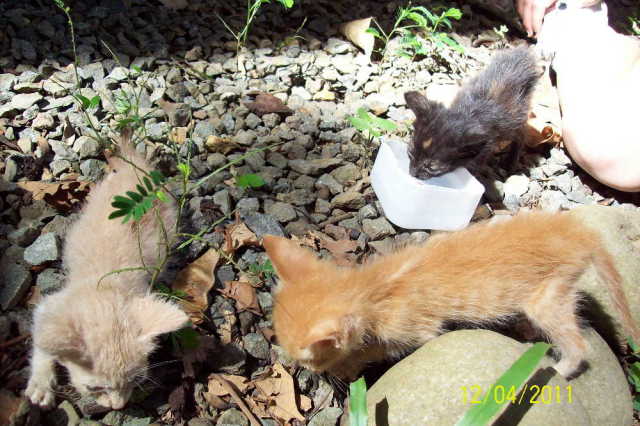 Orphaned baby kittens in the rainforest
Question
kittens
Hello,
My wife and I are volunteers in
Orphaned baby kittens in the rainforest
Question
kittens
Hello,
My wife and I are volunteers in
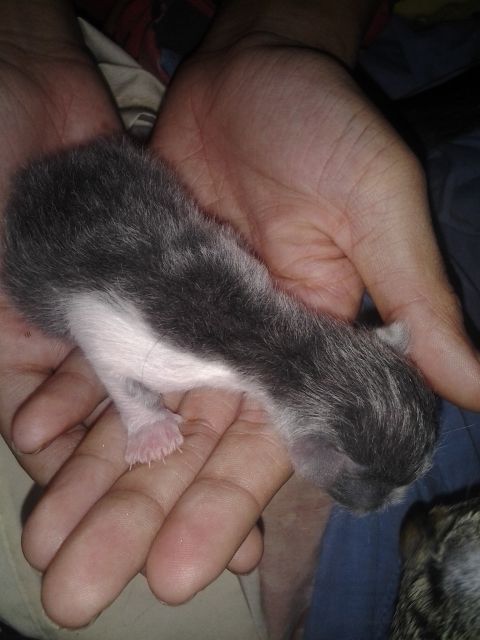 Trouble with my Two female cats.
Question
The kitten Two Cats
Hello, I have
Trouble with my Two female cats.
Question
The kitten Two Cats
Hello, I have
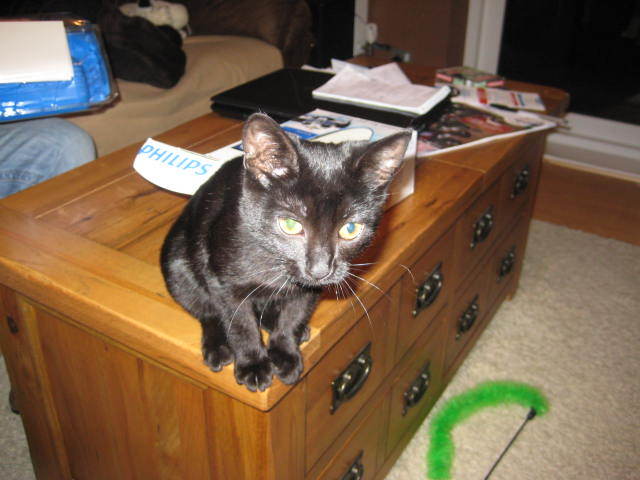 Cat in Heat with a little blood in her stool
Question
Millie Moo
Hi, I have a 5 month old female kit
Cat in Heat with a little blood in her stool
Question
Millie Moo
Hi, I have a 5 month old female kit
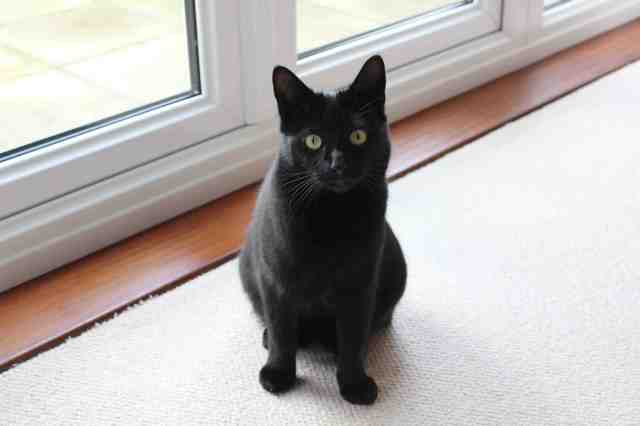 My cats gone missing
Question
Tommy
Hi Jessica,
I do hope that you c
My cats gone missing
Question
Tommy
Hi Jessica,
I do hope that you c
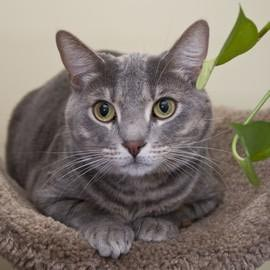 identify breed of cat
Question
Male cat 4 years ol
I recently adopted
identify breed of cat
Question
Male cat 4 years ol
I recently adopted